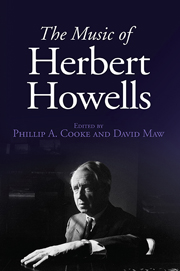Book contents
- Frontmatter
- Dedication
- Contents
- List of Illustrations
- List of Musical Examples
- List of Tables
- List of Contributors
- Foreword
- Acknowledgements
- Miscellaneous Frontmatter
- Introduction: Paradox of an Establishment Composer
- PART I Howells the Stylist
- PART II Howells the Vocal Composer
- PART III Howells the Instrumental Composer
- PART IV Howells the Modern
- PART V Howells in Mourning
- Appendix: Catalogue of the Works of Herbert Howells
- Bibliography
- Index of Works
- General Index
Introduction: Paradox of an Establishment Composer
Published online by Cambridge University Press: 05 December 2013
- Frontmatter
- Dedication
- Contents
- List of Illustrations
- List of Musical Examples
- List of Tables
- List of Contributors
- Foreword
- Acknowledgements
- Miscellaneous Frontmatter
- Introduction: Paradox of an Establishment Composer
- PART I Howells the Stylist
- PART II Howells the Vocal Composer
- PART III Howells the Instrumental Composer
- PART IV Howells the Modern
- PART V Howells in Mourning
- Appendix: Catalogue of the Works of Herbert Howells
- Bibliography
- Index of Works
- General Index
Summary
The Diamond Jubilee of Queen Elizabeth II is a fitting time to take stock of Herbert Howells's compositional achievement and legacy. He was one of the distinguished British composers commissioned to write for the coronation ceremony; and his work for this occasion, the Introit ‘Behold, O God Our Defender’(HH 276), composed by his account on Christmas Day in 1952, seemingly epitomises his position. Aged sixty, he was a doyen of the English musical establishment. A professor at the Royal College of Music (RCM) since 1920, he was an accomplished and highly respected composer of church music who could be counted on to write something that would fit a state ceremonial occasion: music that would reflect national pride and identity before the world; music that would blend with the ceremonial, being part of it and not raising its voice beyond the pageantry.
If the muted tone and warm sound-world of the piece seem on the surface to manifest the respectability that would be expected for such an occasion, they sit oddly with the ecstatic turn the music continually takes. There are just three clauses in the text (one and a half verses of Psalm 84), yet by taking each as the basis of a separate section of music, Howells stretches them into a piece of almost four minutes' duration. In a way scarcely prompted by either the words or the occasion, each of the three sections builds from a soft initial dynamic to an effulgent climax before dying down again.
Information
- Type
- Chapter
- Information
- The Music of Herbert Howells , pp. 1 - 8Publisher: Boydell & BrewerPrint publication year: 2013
